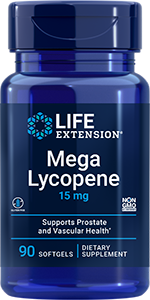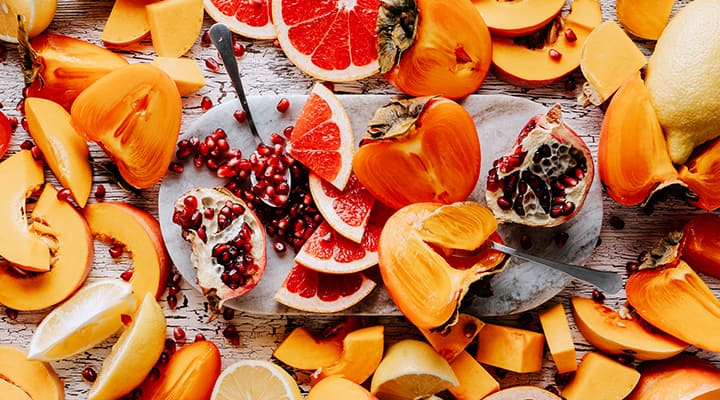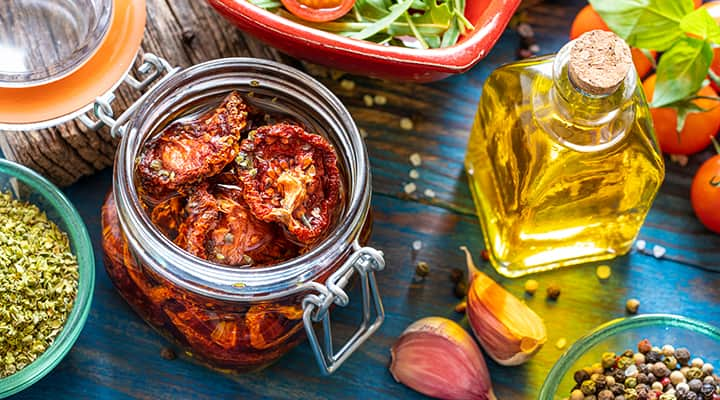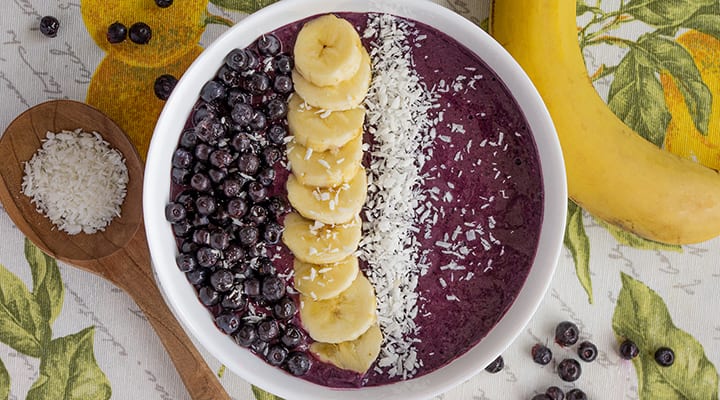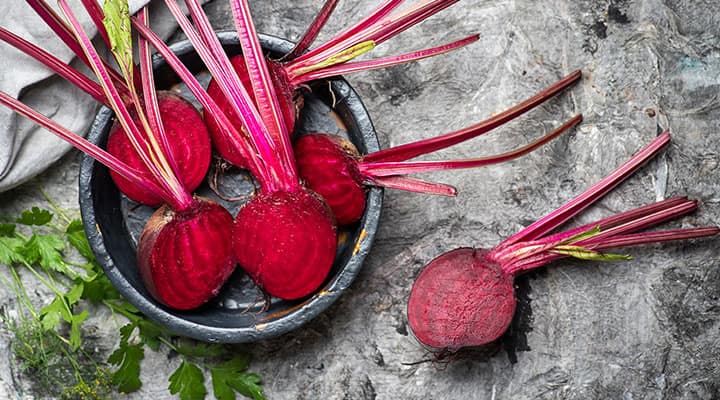
What Is Lycopene? Foods & Supplements
Published: June 2022
You probably know that tomatoes are healthy, but did you know why? Among other nutrients, these rich red fruits (yes, tomatoes are fruits, and not vegetables) are a great source of a wonderful antioxidant called lycopene. If your burger order is “hold the tomatoes,” fortunately, lycopene is available in many other plant-based foods, and taking a lycopene supplement is an extremely popular way to get enough of this antioxidant; in fact, from 1995 to 2004 the world consumption of lycopene has tripled!
So what is lycopene, what’s all the buzz about, and how can you get enough lycopene in your diet? Let’s dive in.
What is lycopene?
Lycopene belongs to a class of pigmented compounds called carotenoids, which also includes beta-carotene, lutein and zeaxanthin (most known for their ability to support eye health). Carotenoids are a type of antioxidant that you can get from fruits and vegetables with bright pigments—think guava, pink grapefruit, carrots, and, of course, tomatoes.
Is lycopene good for you? 5 health benefits of lycopene
Lycopene is indeed very good for you! Let’s count the reasons why this antioxidant is a must-have for your supplement routine:
Prostate support
. Lycopene is most well-known for its support of prostate health. In a systematic review and meta-analysis of 42 studies totaling almost 700,000 individuals, dietary intake and circulating concentrations of lycopene were significantly associated with prostate health.Healthy cells & DNA
. Lycopene can help support healthy cell growth and DNA health. This actually relates to why lycopene supports your prostate. In a clinical trial in men supplementing with lycopene twice a day for 3 weeks promoted prostate health and biomarkers such as PSA (prostate-specific antigen).Bladder health
. In a clinical study, the supplement Men’s Bladder Control, which contains 15 mg of lycopene, was shown to provide support for healthy bladder function during the nighttime.Heart health
. Lycopene is a heart-healthy carotenoid; research shows that it supports the lining of the arteries called the endothelium, and in a meta-analysis it was found to help support healthy blood pressure already within normal range.Already-healthy blood sugar
. Another great health benefit of lycopene is that it helps maintain healthy blood sugar levels already within normal ranges.
And that’s not all…Preclinical data has identified biological actions from lycopene that support reproductive and bone health. Additional findings suggest that lycopene may help protect your liver and brain function; research in the clinical setting is needed to assess these potential benefits.
Where is lycopene found? Best food sources
Vegetables and fruits with bright red pigments, and especially tomatoes and tomato products, are the most lycopene-rich foods. (Added bonus: these foods are also good sources of vitamins, fiber, and other benefits.) Here’s a list of healthy food sources of lycopene and how many milligrams of lycopene you can expect to find in 100 grams.
- Fresh tomatoes (0.72 – 4.2)
- Cooked tomatoes (3.70)
- Tomato sauce (6.20)
- Tomato paste (5.40 – 150)
- Ketchup (9.90 – 13.44)
- Pumpkin (0.38 – 0.46)
- Sweet potato (0.02 – 0.11)
- Pink grapefruit (0.35 – 3.36)
- Carrot (0.65 – 0.78)
- Pink guava (5.23 – 5.5)
- Watermelon (2.30 – 7.2)
- Apricot (0.01 – 0.05)
- Papaya (0.11 – 5.3)
- Rosehip (0.68 – 0.71)
You won’t find high amounts of lycopene in bananas, mushrooms, or other foods that are not plant-based and reddish in color...of course, that doesn't mean they aren't good sources of other healthy nutrients such as vitamins and antioxidants.
Explore Our Best Heart Health Supplements
Which 5 foods are rich in lycopene?
The best sources of lycopene are red-fleshed foods. These lycopene-rich foods are also jammed packed with other nutrients that provide an array of other health benefits.
Tomato
. This is the most well-known source of lycopene! Cooked tomatoes tend to supply the highest amounts of bioavailable lycopene. Tomato products like sauces and ketchup might supply more in weight, but most people don’t consume a large amount on their dishes relative to eating a whole tomato. Another great way to obtain the lycopene benefits from tomatoes is with a delicious tomato soup. Substitute that for clam chowder any day!Pumpkin
. Not only is the meat or pulp of the pumpkin rich in lycopene, but the seeds come with their own benefits as well! Their seeds contain tryptophan, essential fatty acids, and antioxidant phytonutrients that help support bladder and prostate health.Watermelon
. This sweet fruit is a great source of lycopene and an even better healthy low-calorie snack.Carrots
. Carrots are some of the most carotenoid-rich foods. Red carrots are the highest in lycopene and also contain even greater amounts of beta-carotene along with some alpha-carotene (hence their eponymous name).Papaya
. What used to be a considered a rare and exotic fruit is now a popular supermarket find. Papaya is packed full of free-radical fighting carotenoids beyond lycopene, such as zeaxanthin, lutein, and beta-carotene. They also contain papain, an enzyme that promotes digestion. Look out for papayas next you go grocery shopping!
Is lycopene found in tomatoes?
That’s correct! In fact, tomatoes are the most commonly eaten food that’s lycopene-rich.
What fruit has the most lycopene?
Cooked tomatoes, of course!
Does cooking destroy lycopene?
Cooking at high temperatures may cause a loss of certain beneficial nutrients from your food, including vitamins and antioxidants. However, certain heating methods have been shown to improve the bioavailability of lycopene in tomatoes. Although this might be esoteric organic chemistry, lycopene in nature is in its all-trans chemical form, and this is not readily bioavailable. Heating tomatoes has been shown to produce the more of the bioavailable cis-lycopene.
In fact, in a meta-analysis published in Nature that included multiple types of studies such as randomized placebo-controlled trials and case-control studies, consumption of tomato foods, cooked tomatoes, and sauces were associated with a healthy prostate, whereas consumption of raw tomatoes was not associated with a statistically significant improvement.
Note: Research is needed to assess how different cooking methods might affect lycopene bioavailability in other foods.
How cooking tomatoes changes lycopene bioavailability
When it comes to how your body uses the lycopene that’s in your food, how it’s prepared really matters. Some interesting facts:
Slow & low for the win
. Sundried tomatoes, which are slow cooked at a low temperature, have better lycopene bioavailability than fresh or canned tomatoes.Add some EVOO
. Cooking oils make a difference, too. One study showed that lycopene level in human plasma is increased further upon eating tomatoes cooked with olive oil compared to being cooked without this healthy fat.Good news & bad news about tomato sauce
. Tomato paste and sauce are made using an industrial method called thermal processing. These tomato products have more bioavailable lycopene than a fresh tomato, but the thermal processing degrades certain forms of vitamins A, C, and E. One study showed that despite this, the thermal processing results in greater total antioxidant activity compared to fresh tomatoes.Word to the wise: Eating foods cooked vs. raw
If you’re surprised that cooked tomatoes are a better source of lycopene than this fruit in the raw, you’re not alone! Cooked tomatoes may be an exception to conventional wisdom which suggests that eating certain foods raw is healthier than cooking these foods because cooking may create certain unfavorable chemical reactions.
Applying heat to food creates AGEs (advanced glycation end-products). Low-heat cooking methods such as poaching and steaming are safe because they result in minimal AGE formation, whereas high heat cooking such as grilling and frying causes potentially impactful levels of AGE’s.
As always, moderation is key! Some heating methods produce bioavailable lycopene in tomatoes, but there’s no need to limit yourself to only eating cooked tomatoes or tomato products. Try some ready-to-serve fresh tomatoes every now and then.
Should I take lycopene supplements?
Lycopene is one of the top supplements men should take because of its benefits to prostate health. If you are not sure if lycopene is right for you, take the men’s health quiz to help you find out!
Are lycopene supplements safe? Side effects
Lycopene has been on the market for many decades and has demonstrated a great safety profile. Supplements have used lycopene safely in doses of 15-45 mg for 4-6 months. Some evidence suggests that 120 mg daily is safe for up to one year.
For pregnancy and breastfeeding, lycopene is thought to be safe when consumed in amounts normally found in foods. Consult a doctor before supplementing with lycopene if pregnant or breastfeeding. The information is still inconclusive…but better safe than sorry.
Which supplements cannot be taken with lycopene?
Lycopene is perfectly fine to take with other supplements.
How much lycopene should I supplement with per day?
Research suggests that 10-15 mg is a healthy dose for lycopene. As mentioned above, supplements have been used safely in doses of 15-45 mg for 4-60 months.
How do you choose a high-quality lycopene supplement?
You may wish to take lycopene as a stand-alone supplement or as an ingredient in multi-nutrient formulas that contain, such as Once-Daily Health Booster (which also contains other vitamins). If your specific health goal is supporting your prostate, Ultra Prostate Formula contains a lycopene-containing tomato extract, as well as several other nutrients that work on multiple mechanisms to encourage overall prostate health.
References
- Abushita AA et al. “Change in carotenoids and antioxidant vitamins in tomato as a function of varietal and technological factors.” J Agric Food Chem., 2000, https://pubmed.ncbi.nlm.nih.gov/10888501/
- Fraser GE et al. “Tomato consumption and intake of lycopene as predictors of the incidence of prostate cancer: the Adventist Health Study-2.” Cancer Causes Control, April 2020, https://pubmed.ncbi.nlm.nih.gov/32100191/
- Gärtner C et al. “Lycopene is more bioavailable from tomato paste than from fresh tomatoes.” Am J Clin Nutr., July 1997, https://pubmed.ncbi.nlm.nih.gov/9209178/
- Hirsh, Steven P et al. “Self-Assessed Benefits of a Prostate Health Formulation on Nocturia in Healthy Males With Mild Lower Urinary Tract Symptoms: An Open Label Study.” Global advances in health and medicine, November2020, https://www.ncbi.nlm.nih.gov/pmc/articles/PMC7705803/
- Imran, Muhammad et al. “Lycopene as a Natural Antioxidant Used to Prevent Human Health Disorders.” Antioxidants, August2020, https://www.ncbi.nlm.nih.gov/pmc/articles/PMC7464847/
- Kong, Kin-Weng et al. “Revealing the power of the natural red pigment lycopene.” Molecules, February 2010, https://www.ncbi.nlm.nih.gov/pmc/articles/PMC6263198/
- Mahnaz Rezaei Kelishadi, et al. “Lycopene Supplementation and Blood Pressure: Systematic review and meta-analyses of randomized trials” Journal of Herbal Medicine, 2022, https://www.sciencedirect.com/science/article/abs/pii/S2210803321001019
- Mirahmadi M et al. “Potential inhibitory effect of lycopene on prostate cancer.” Biomed Pharmacother. September 2020, https://pubmed.ncbi.nlm.nih.gov/32768949/
- Mozos, Ioana et al. “Lycopene and Vascular Health.” Frontiers in pharmacology, May 2018, https://www.ncbi.nlm.nih.gov/pmc/articles/PMC5974099/
- Uribarri, Jaime et al. “Advanced glycation end products in foods and a practical guide to their reduction in the diet.” Journal of the American Dietetic Association, https://pubmed.ncbi.nlm.nih.gov/20497781/
- Vaishampayan, U et al. “Lycopene and soy isoflavones in the treatment of prostate cancer.” Nutr Cancer., 2007, https://pubmed.ncbi.nlm.nih.gov/17927495/
- Ware, Megan, RDN, L.D. “What are the health benefits of papaya?” MedicalNewsToday, December 2017, https://www.medicalnewstoday.com/articles/275517
- “Carotenoids.” Oregon State University, Linus Pauling Institute. https://lpi.oregonstate.edu/mic/dietary-factors/phytochemicals/carotenoids

